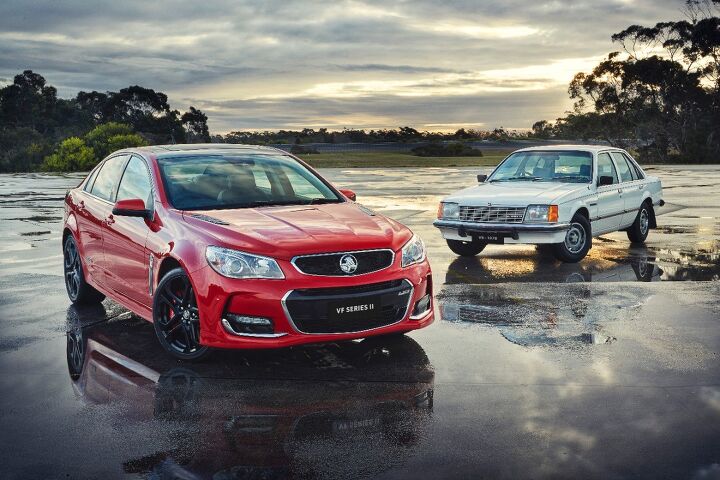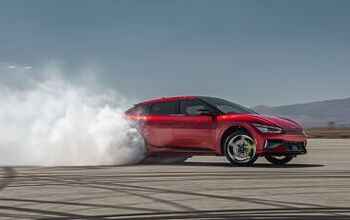This Is the End: R.I.P., Australian-built Automobiles

Maybe the dingo ate your industry? No, that cruel joke doesn’t hold a grain of truth — Australia’s domestic auto industry simply fell victim to the harsh realities of economics and globalization.
No longer a captive market, no longer a country with steep walls built of tariffs, the land Down Under found it could no longer sustain its own vehicle manufacturing presence. Because of this, today marks the end of it all. Workers will leave the Holden assembly plant in Elizabeth, South Australia, closing the door on the GM subsidiary’s 69-year Aussie car-building history.
It seems the final vehicle to leave the plant was fittingly badass.
According to Motor Authority, the final vehicle produced on (red) home soil was a 2017 Holden Commodore SS-V Redline, the hottest model in Holden’s lineup, which rolled out of Elizabeth on Wednesday. (Watch the workers spell out their company’s name with their bodies in this poignant Australian Broadcasting Corporation segment.)
A full-size, rear-drive sedan, the top-flight Commodore packed a 6.2-liter LS3 V8 making 407 horsepower and 420 lb-ft of torque. Early-80s Mel Gibson would be proud.
From this day forward, all vehicles bought Down Under will be imported from other countries, including Holden vehicles. Toyota closed its assembly plant earlier this month, and Ford packed up last year.
It’s not just the manufacturing landscape that’s changing in Australia; so too is the range of vehicles Aussie have grown accustomed to. The advent of popular SUVs and crossovers means the car-based pickup, a quintessentially Australian vehicle, is no more. With the demise of local manufacturing, the Commodore-based — and Australia-only — Holden Ute is also extinct. Ford’s Falcon Ute, a long-time competitor, ceased production in 2016.
The Falcon nameplate, first affixed to a revolutionary (and quite bland) compact car in the U.S. for the 1960 model year, soldiered on Down Under for decades with a traditional rear-drive layout.
Holden’s manufacturing absence in Australia also has implications for American buyers. The Commodore-based U.S.-market Chevrolet Caprice PPV, in production for six years, was the hot rod of law enforcement fleets, though it never attained the popularity of its Ford and Dodge counterparts. Orders closed at the end of February.
The model’s civilian version, the Chevrolet SS, bit the dust this spring. As a full-size, rear-wheel drive sedan with a naturally aspirated V8 and available manual transmission, the SS was a low-volume throwback that buyers only started noticing when it was too late.
[Images: General Motors]

More by Steph Willems
Latest Car Reviews
Read moreLatest Product Reviews
Read moreRecent Comments
- Varezhka I have still yet to see a Malibu on the road that didn't have a rental sticker. So yeah, GM probably lost money on every one they sold but kept it to boost their CAFE numbers.I'm personally happy that I no longer have to dread being "upgraded" to a Maxima or a Malibu anymore. And thankfully Altima is also on its way out.
- Tassos Under incompetent, affirmative action hire Mary Barra, GM has been shooting itself in the foot on a daily basis.Whether the Malibu cancellation has been one of these shootings is NOT obvious at all.GM should be run as a PROFITABLE BUSINESS and NOT as an outfit that satisfies everybody and his mother in law's pet preferences.IF the Malibu was UNPROFITABLE, it SHOULD be canceled.More generally, if its SEGMENT is Unprofitable, and HALF the makers cancel their midsize sedans, not only will it lead to the SURVIVAL OF THE FITTEST ones, but the survivors will obviously be more profitable if the LOSERS were kept being produced and the SMALL PIE of midsize sedans would yield slim pickings for every participant.SO NO, I APPROVE of the demise of the unprofitable Malibu, and hope Nissan does the same to the Altima, Hyundai with the SOnata, Mazda with the Mazda 6, and as many others as it takes to make the REMAINING players, like the Excellent, sporty Accord and the Bulletproof Reliable, cheap to maintain CAMRY, more profitable and affordable.
- GregLocock Car companies can only really sell cars that people who are new car buyers will pay a profitable price for. As it turns out fewer and fewer new car buyers want sedans. Large sedans can be nice to drive, certainly, but the number of new car buyers (the only ones that matter in this discussion) are prepared to sacrifice steering and handling for more obvious things like passenger and cargo space, or even some attempt at off roading. We know US new car buyers don't really care about handling because they fell for FWD in large cars.
- Slavuta Why is everybody sweating? Like sedans? - go buy one. Better - 2. Let CRV/RAV rust on the dealer lot. I have 3 sedans on the driveway. My neighbor - 2. Neighbors on each of our other side - 8 SUVs.
- Theflyersfan With sedans, especially, I wonder how many of those sales are to rental fleets. With the exception of the Civic and Accord, there are still rows of sedans mixed in with the RAV4s at every airport rental lot. I doubt the breakdown in sales is publicly published, so who knows... GM isn't out of the sedan business - Cadillac exists and I can't believe I'm typing this but they are actually decent - and I think they are making a huge mistake, especially if there's an extended oil price hike (cough...Iran...cough) and people want smaller and hybrids. But if one is only tied to the quarterly shareholder reports and not trends and the big picture, bad decisions like this get made.



































Comments
Join the conversation
One thing I cannot understand about Australians is how they walk and drive cars upside down.
http://www.go-dove.com/en/events?cmd=details&event=641116&utm_source=Eloqua&utm_medium=email&utm_content=week-1&utm_campaign=gidb_2018_q1_nov_apac_au_en_641116_ia_e2_im%2Fhandling%2Fnon_time Just received the announcement, the equipment is being auctioned.